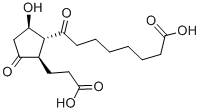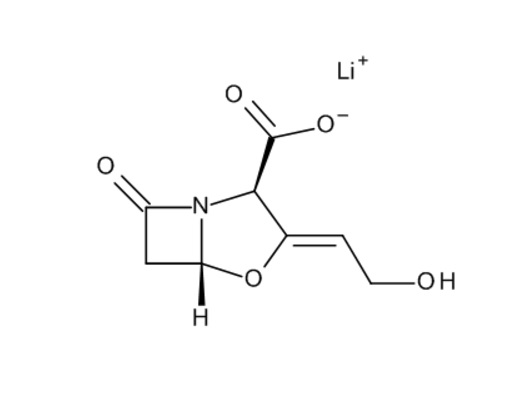9,15-DIOXO-11ALPHA-HYDROXY-2,3,4,5-TETRANOR-PROSTAN-1,20-DIOIC ACID
- CAS NO.:24769-56-0
- Empirical Formula: C16H24O7
- Molecular Weight: 328.36
- MDL number: MFCD00797649
- SAFETY DATA SHEET (SDS)
- Update Date: 2024-10-28 23:16:16

What is 9,15-DIOXO-11ALPHA-HYDROXY-2,3,4,5-TETRANOR-PROSTAN-1,20-DIOIC ACID?
Description
tetranor-
The Uses of 9,15-DIOXO-11ALPHA-HYDROXY-2,3,4,5-TETRANOR-PROSTAN-1,20-DIOIC ACID
The major urinary metabolite of Prostaglandin E2 (P838610).
What are the applications of Application
tetranor-PGEM is a marker for PGE2 biosynthesis
Definition
ChEBI: A prostanoid that is prostaglandin E2 in which the acyclic hydroxy group has been oxidised to the corresponding ketone, the methyl group has been oxidised to the corresponding carboxylic acid and the 6-carboxyhexenyl group has been oxidatively cleaved to a 2-carboxyethyl group. It is the major urinary metabolite of prostaglandin E2.
Properties of 9,15-DIOXO-11ALPHA-HYDROXY-2,3,4,5-TETRANOR-PROSTAN-1,20-DIOIC ACID
| Boiling point: | 622.2±50.0 °C(Predicted) |
| Density | 1.266±0.06 g/cm3(Predicted) |
| storage temp. | Store at -20°C |
| solubility | DMF: 50 mg/ml; DMSO: 50 mg/ml; Ethanol: Not Stable; PBS (pH 7.2): 1 mg/ml |
| form | Liquid |
| pka | 4.61±0.10(Predicted) |
| color | Colorless to light yellow |
Safety information for 9,15-DIOXO-11ALPHA-HYDROXY-2,3,4,5-TETRANOR-PROSTAN-1,20-DIOIC ACID
Computed Descriptors for 9,15-DIOXO-11ALPHA-HYDROXY-2,3,4,5-TETRANOR-PROSTAN-1,20-DIOIC ACID
New Products
4-AMINO-TETRAHYDRO-PYRAN-4-CARBOXYLIC ACID HCL 4-(Dimethylamino)tetrahydro-2H-pyran-4-carbonitrile 4-Aminotetrahydropyran-4-carbonitrile Hydrochloride (R)-3-Aminobutanenitrile Hydrochloride 3-((Dimethylamino)methyl)-5-methylhexan-2-one oxalate 1,4-Dioxa-8-azaspiro[4.5]decane 5-Bromo-2-nitropyridine Nimesulide BP Aceclofenac IP/BP/EP Diclofenac Sodium IP/BP/EP/USP Mefenamic Acid IP/BP/EP/USP Ornidazole IP Diclofenac Potassium THOMAIND PAPER PH 2.0 TO 4.5 1 BOX BUFFER CAPSULE PH 9.2 - 10 CAP SODIUM CHLORIDE 0.1N CVS ALLOXAN MONOHYDRATE 98% PLATINUM 0.5% ON 3 MM ALUMINA PELLETS (TYPE 73) LITHIUM AAS SOLUTION 2-Bromo-1-(bromomethyl)-3-chloro-5-nitrobenzene 2-Bromo-3-nitroaniline N-(3-Hydroxypropyl)-N-methylacetamide 3-Bromo-6-chloropyridazine 4-ethyl-3-nitrobenzoic acidRelated products of tetrahydrofuran








You may like
-
 1-Methyl-6-oxo-1,6-dihydropyridazine-3-carbonitrile 98%View Details
1-Methyl-6-oxo-1,6-dihydropyridazine-3-carbonitrile 98%View Details
99903-60-3 -
 88491-46-7 98%View Details
88491-46-7 98%View Details
88491-46-7 -
 1823368-42-8 98%View Details
1823368-42-8 98%View Details
1823368-42-8 -
 2-(3-(tert-butyl)phenoxy)-2-methylpropanoic acid 1307449-08-6 98%View Details
2-(3-(tert-butyl)phenoxy)-2-methylpropanoic acid 1307449-08-6 98%View Details
1307449-08-6 -
 Ethyl 3-(furan-2-yl)-3-hydroxypropanoate 25408-95-1 98%View Details
Ethyl 3-(furan-2-yl)-3-hydroxypropanoate 25408-95-1 98%View Details
25408-95-1 -
 2-Chloro-5-fluoro-1-methoxy-3-methylbenzene 98%View Details
2-Chloro-5-fluoro-1-methoxy-3-methylbenzene 98%View Details
1805639-70-6 -
 1784294-80-9 98%View Details
1784294-80-9 98%View Details
1784294-80-9 -
 Lithium ClavulanateView Details
Lithium ClavulanateView Details
61177-44-4
Statement: All products displayed on this website are only used for non medical purposes such as industrial applications or scientific research, and cannot be used for clinical diagnosis or treatment of humans or animals. They are not medicinal or edible.